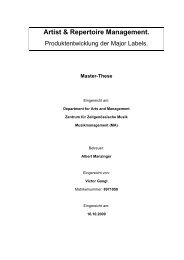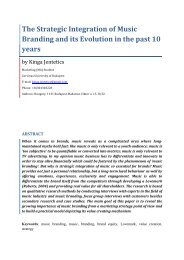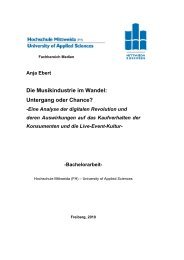Editorial by Dennis Collopy and Peter Tschmuck - Music Business ...
Editorial by Dennis Collopy and Peter Tschmuck - Music Business ...
Editorial by Dennis Collopy and Peter Tschmuck - Music Business ...
Create successful ePaper yourself
Turn your PDF publications into a flip-book with our unique Google optimized e-Paper software.
4 International Journal of <strong>Music</strong> <strong>Business</strong> Research, April 2013, vol. 2 no. 1<br />
<strong>Editorial</strong><br />
<strong>Dennis</strong> <strong>Collopy</strong> 1 <strong>and</strong> <strong>Peter</strong> <strong>Tschmuck</strong> 2<br />
The first issue of the second volume again reflects the broad range of<br />
music business research topics covered <strong>by</strong> the International Journal of<br />
<strong>Music</strong> <strong>Business</strong> Research (IJMBR). Whereas two papers share a focus on<br />
music consumption behaviour, the third one sheds light on the Chinese<br />
digital music industry.<br />
In the first article, Michael Huber presents the results of a representative<br />
survey for the Austrian population on its music listening behaviour.<br />
The highlights of the article include data on live concerts with<br />
little more than a third of the Austrians going to concerts several times a<br />
year but a quarter never attending a live musical performance. More<br />
than half of the respondents own at least 50 original sound recordings<br />
on a physical carrier <strong>and</strong> one fifth possess the equivalent number of<br />
digital music files. Despite the low level of live music attendance <strong>and</strong><br />
recorded music purchases, music listening is the most preferred leisure<br />
time activity for Austrians. However, the main music consumption hub is<br />
still radio, followed <strong>by</strong> the computer <strong>and</strong> the mp3-player for the younger<br />
generation <strong>and</strong> CDs as well as TV for the older age groups. The results<br />
also highlight a gap between the generations, with the 50+ group, still<br />
relying on the traditional music consumption channels, <strong>and</strong> "Generation<br />
Web 2.0", who grew up with new online media. The author concludes<br />
that youngsters "(…) like their music to be uncomplicated, convenient<br />
<strong>and</strong> inexpensive" (p. 31).<br />
Adopting a different approach but with a similar aim, Juan Montoro-<br />
Pons analyses the audiences for popular music concerts in Spain. In an<br />
1 <strong>Dennis</strong> <strong>Collopy</strong> is senior lecturer in the <strong>Music</strong> <strong>and</strong> Entertainment Industry Management programme<br />
in the Faculty of Science, Technology <strong>and</strong> Creative Arts at the University of Hertfordshire<br />
<strong>and</strong> co-founder of the <strong>Music</strong> <strong>and</strong> Entertainment Industries Research Group at the University of<br />
Hertfordshire, UK.<br />
2 <strong>Peter</strong> <strong>Tschmuck</strong> is professor for Culture Institutions Studies at the Institute for Cultural Management<br />
<strong>and</strong> Cultural Studies at the University of <strong>Music</strong> <strong>and</strong> Performing Arts Vienna, Austria with a<br />
focus on music business <strong>and</strong> industry research. He is the author of the book "Creativity <strong>and</strong> Innovation<br />
in the <strong>Music</strong> Industry" (2 nd edition, Springer, 2012).
<strong>Editorial</strong> 5<br />
econometric dem<strong>and</strong> model, the author explains the frequency of attendance<br />
at live music performances <strong>and</strong> its relationship to media participation.<br />
His analysis is based on data from two waves of the "Survey<br />
for Habits <strong>and</strong> Cultural Practices in Spain" (2006 <strong>and</strong> 2010). The Spanish<br />
data show that roughly 12 percent of the respondents in Spain attended<br />
a live music performance over the previous three months, a statistic that<br />
is in line with the results of the Austrian survey. Moreover the statistical<br />
model predicts the likelihood of live music attendance is driven <strong>by</strong> cultural<br />
capital accumulated through media participation or as the author<br />
puts it: "[T]he average profile of the live music consumer [is] a male,<br />
young, educated consumer with time availability <strong>and</strong> actively engaged in<br />
the media consumption of recorded music, both <strong>by</strong> purchasing <strong>and</strong> <strong>by</strong><br />
copying <strong>and</strong> downloading music files <strong>and</strong> full albums" (p. 51). In other<br />
words, the more recorded music is consumed the higher the probability<br />
of concert attendance.<br />
In the final article of this issue, John Fangjun Li examines the development<br />
of the digital music industry in China. The digital market segment<br />
has a higher economic relevance within China's music industry<br />
than comparable Western music markets. Li distinguishes three types of<br />
music companies in China: (1) traditional record companies, engaged in<br />
mobile <strong>and</strong> online music distribution; (2) technology driven companies<br />
with a strong link to the Internet; (3) telecommunication companies<br />
bundling music in their multimedia packages. Despite their differences,<br />
these three different business models are converging in the near future<br />
into a new kind of all-inclusive media enterprises, based on Internet <strong>and</strong><br />
mobile networks. Might China be the forerunner of the digital music<br />
industry for the 21 st century?<br />
The IJMBR is aimed at all academics, from students to professors,<br />
from around the world <strong>and</strong> from all disciplines with an interest in music<br />
business research. Interdisciplinary papers are especially welcomed if<br />
they address economic <strong>and</strong> business related topics in the field of music.<br />
Thus, we look forward to receiving as many interesting papers as possible<br />
<strong>and</strong> request that you send papers for consideration to:<br />
music.business.research@gmail.com.





